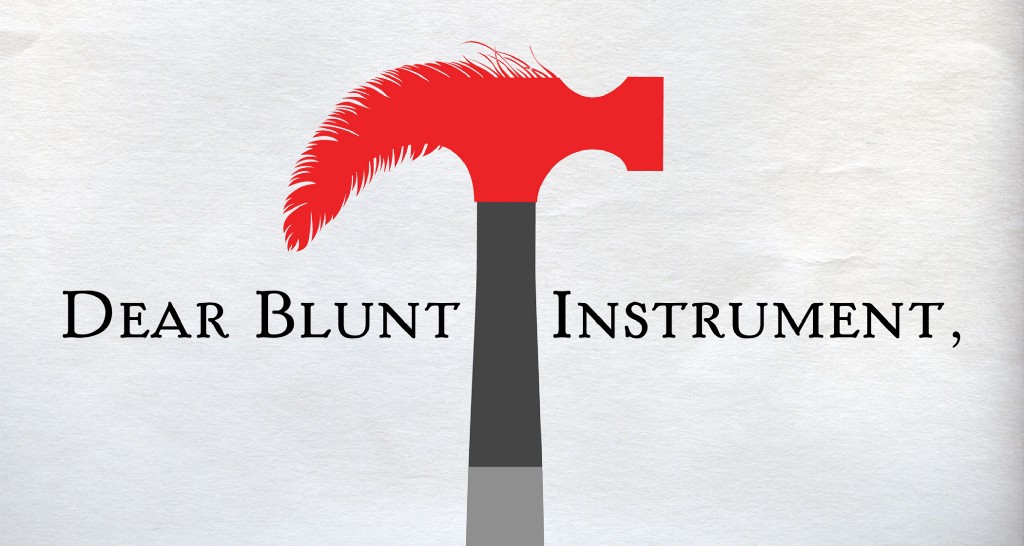interviews
“Connections and luck do matter”: The Blunt Instrument on MFAs, Networking, and Ornamental Style.

The Blunt Instrument is a monthly advice column for writers. If you need tough advice for a writing problem, send your question to blunt@electricliterature.com.
Hi there, Blunt Instrument. I need your rough touch in my life. Here are my questions:
* Is it possible for an over-30, rural, broke, non-MFA’d person living far away from any big, literary city to have a successful writing career in 2015?
* What is so magical about an MFA? Does it provide networking/connections opportunities that are necessary to getting ahead?
Is it honestly who you know and not what you do that gets your foot in the door (in literary magazines and publishers)?
* Everyone always denies, denies, denies that any of this matters. But the evidence seems to contradict these denials, and I wish someone would just admit that these things matter — sometimes more than talent.
Thanks for reading.
Sincerely,
Over-30, Non-MFA’d Country Bumpkin
Dear Bumpkin,
People who deny that connections and luck matter to literary success probably have some measure of literary success themselves, and are therefore reluctant to admit — even to themselves — that anything other than talent might be involved. It’s a lie. Connections and luck do matter. Still, you absolutely can have a successful writing career if you’re over 30, rural, broke, and non-MFA’d, and I’ll say more on this later, but first, let’s talk about what’s so “magical” about an MFA:
* Getting an MFA puts you in a position to make connections that are conducive, if not strictly necessary, to getting ahead. This plays out in a number of ways, most of which are not particularly icky or nepotistic. For example:
a) You form a community of writer friends who you feel kinship with; you read and edit each other’s work; you encourage and challenge each other; you keep each other busy and honest; and, to some extent, you feel competitive with each other, which drives all of you to accomplish more. Some among you may even found magazines or become editors at existing journals and presses, and subsequently publish and promote each other.
b) You seek out mentorship. Working with a teacher you admire can be hugely influential and occasionally lead to opportunities you wouldn’t otherwise have.
* MFA programs also give writers more access to honest readership, so it’s a good way to find out if you’re writing stuff that has no market (i.e. nobody wants to read it). The relevant question here is not “Can creative writing be taught?” but “Can creative writing be learned?” I’ve been in both teacher and student roles, and it’s obvious to me that writers can get better, with guidance. If you don’t believe your writing can be improved, this may not work for you.
* Giving yourself two to three years of focused writing time (whether or not it is funded) can have transformative effects; it’s permissive and legitimizing and may help writers understand both how seriously they should be taking their art and how much work is involved to do it well. In other words, for many getting an MFA just redoubles their commitment to writing.
* Economically, some correlation is probably involved: If you can afford to get an MFA, then you can afford to play the game in general. Writing and reading and doing the rest of the administrative work required to get published take up a lot of time, most of which is uncompensated, especially at first.
You can do all of this (find a community, carve out dedicated writing time, etc.) without getting an MFA, but an MFA is a structured system that makes these things easier to achieve in a short time period. In my opinion, that’s what you’re paying for, more than the largely useless degree. And the connections in particular can be very helpful when it comes to publishing. Many of my early poems were published by people I met at readings. My first book was published by a press founded by a few of my MFA classmates. Things like this helped me get from zero visibility to some visibility, so that I could start to be known on my own terms.
But now I want to get to my real answer, which is this: Regardless of what advantages you do or don’t have, a successful writing career takes much more work than you expect. Even the lucky, rich, beautiful 23-year-olds in New York are very likely working harder than you think. When anyone achieves writing “fame,” they appear to have come out of nowhere, but that’s how it works by design: you can’t see all the hustling people are doing before they become famous because they’re not famous yet!
If you want to get published, do everything you can to mimic those MFA advantages in your no-MFA life. Read and write like you’re paying for it (you are). Get better; no matter where you’re starting from, you can be better, and no matter how connected you are, being a better writer helps. (Remember that “talent” doesn’t exist in a vacuum. You need an audience to judge your talent, and it will be judged differently by different audiences.) Find a community (online is almost as good!). Consider taking classes — there are lower-cost, lower-commitment options outside MFAs. Figure out your market — where would you publish if you could? (Start way, way below The New Yorker.) But most importantly, get perspective on what it takes to be a successful writer. Published writers may be luckier than you, but they’re probably also working harder.
Sincerely,
The Blunt Instrument
Hello,
I am glad you launched this advice column. Even though I am not much of a writer, I frequently dabble in the art after intense periods of inspiration, and I’m an avid reader of the classics. It appears to me that most people prefer easy, simple writing that doesn’t require the skill, patience, and appreciation needed to get through what I call ‘ornamental’ writing, which is literary prose with grand form and language. As a writer, should you appeal to people’s tastes and write simple prose — as some writers, such as Stephen King, preach — or should you aim for the beauty of form and language following in the trails of our great writers no matter what people think?!
Best regards,
rana faraj
Dear RF,
First let me establish that you’re presenting something of a false choice. As Electric Lit editor Lincoln Michel has noted, there is no one ideal reader. We need simple books for readers who like simple books and ornamental books for readers who like ornamental books. So the question is not what should writers do in general, but what should you, specifically, do when you write?
The answer to this second question depends somewhat on your intended audience. If you want to reach the widest possible audience, it may serve your goals to write simple prose, which tends to foreground things like plot and character (in fiction) and conveyance of information (in nonfiction) over the texture of the language itself. Most — but not all, of course — bestsellers follow the Stephen King model. (It’s worth noting that “simple” prose may be easier to read, but it’s not necessarily easy to write; we have to learn how to write with clarity and concision. Further, simple prose can be used to communicate complex ideas.) But I gather from your letter that simple prose is not the prose that speaks to you; you’re interested in “grand form” and “the beauty of language.”
The thing is, style isn’t something you apply after the fact, like an Instagram filter. The style comes out of the writing. So I’ll turn it around on you. What kind of prose do you want to write? There’s a contradiction in your self-description as someone who only “dabbles” in writing and yet experiences “intense periods of inspiration.” Intensity and dabbling don’t really go together. If you want to find your style, look to what you do when you’re intensely inspired, not what you do when you dabble.
Best of luck,
The Blunt Instrument








